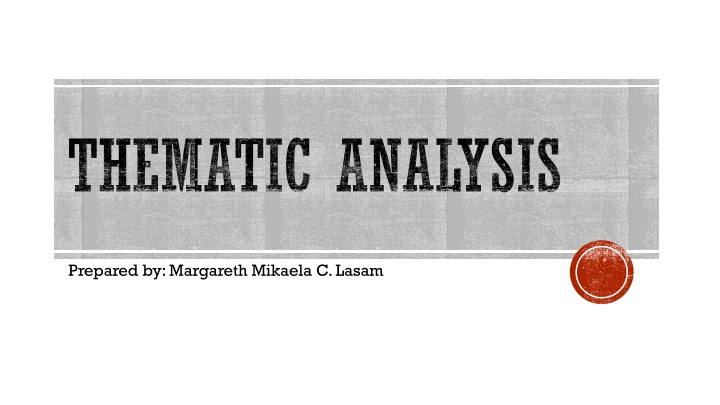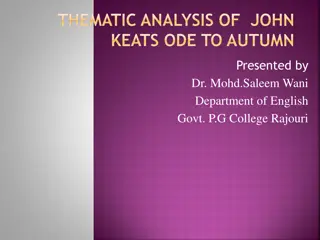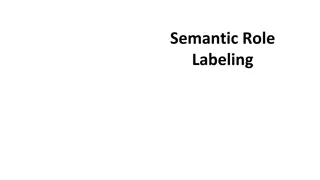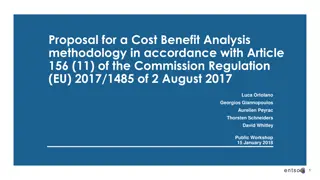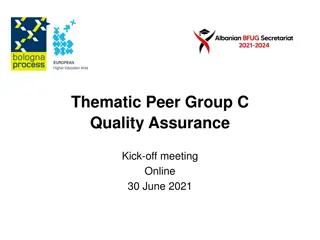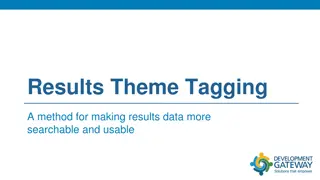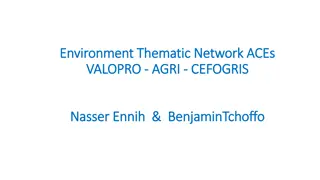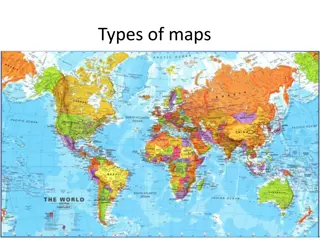Thematic Analysis: Overview and Methodology
Thematic analysis is a systematic method for identifying patterns of meaning in qualitative data. Developed by Braun and Clarke, it offers insights into common themes across datasets, not focused on individual unique experiences. The process involves identifying, organizing, and interpreting these themes to make sense of the data. Various forms of thematic analysis exist, each with its own approach to data coding and analysis. A worked example by Braun & Clarke illustrates how this method can be applied in research settings to explore topics like sexuality and gender identity in higher education.
Download Presentation

Please find below an Image/Link to download the presentation.
The content on the website is provided AS IS for your information and personal use only. It may not be sold, licensed, or shared on other websites without obtaining consent from the author.If you encounter any issues during the download, it is possible that the publisher has removed the file from their server.
You are allowed to download the files provided on this website for personal or commercial use, subject to the condition that they are used lawfully. All files are the property of their respective owners.
The content on the website is provided AS IS for your information and personal use only. It may not be sold, licensed, or shared on other websites without obtaining consent from the author.
E N D
Presentation Transcript
THEMATIC ANALYSIS Prepared by: Margareth Mikaela C. Lasam
TOPIC OVERVIEW What is Thematic Analysis Six-Phase approach to Thematic Analysis How to do a good Thematic Analysis
WHAT IS THEMATIC ANALYSIS ? Until recently, thematic analysis (TA) was a widely used yet poorly defined method of qualitative data analysis. But, Braun and Clarke (2006) developed TA (in relation to psychology) in a systematic and sophisticated way Hence, TA became widely recognized as a unique and valuable method in its own right, alongside other more established qualitative approaches like grounded theory,narrative analysis,or Discourse Analysis.
WHAT IS THEMATIC ANALYSIS ? TA is a method for systematically identifying, organizing, and offering insight into patterns of meaning (themes) across a data set. Identifying unique and idiosyncratic meanings and experiences found only within a single data item is not the focus of TA. But It is a way of identifying what is common to the way a topic is talked or written about and of making sense of those commonalities. Example:white-collar workers experiences of sociality at work.
WHAT IS THEMATIC ANALYSIS ? TA has a different forms to use, inductive versus deductive or theory-driven data coding and analysis, an experiential versus critical orientation to data, and an essentialist versus constructionist theoretical perspective.
THEMATIC ANALYSIS : WORKED EXAMPLE Braun & Clarke, 2009, used a worked example from an ongoing project that examines sexuality,gender identity,and higher education Part of the project involved interviewing 20 LGBT-identified students in New Zealand (10 students) and Britain (10 students) to understand their experiences of university life. A semi structured interview was conducted, and it lasted around 1 hour. Participants were asked about their expectations of university life, whether they were out (open) about their sexuality at university, their experiences of the classroom and the curriculum, their views on LGBT lecturers coming out in the classroom, and, if they were studying a people based discipline (Ellis, 2009), whether LGBT issues were included when relevant. The interviews were audio recorded and then transcribed orthographically, reproducing all spoken words and sounds
SIX PHASES OF THEMATIC ANALYSIS 1STPHASE: FAMILIARIZING WITH THE DATA This is a brief example from Andreas interview Andreas:...I sometimes try to erm not conceal it that s not the right word but erm let s say I m in a in a seminar and somebody- a a man says to me oh look at her (Int:mm) I m not going oh actually I m gay (Int: mm [laughter]) I ll just go like oh yeah (Int: mmhm) you know I won t fall into the other one and say oh yeah (Int:yep) she looks really brilliant (Int: yep) but I sorta then and after them you hate myself for it because I don t know how this person would react because that person might then either not talk to me anymore or erm might sort of yeah (Int: yep) or next time we met not sit next to me or that sort of thing (Int: yep) so I think these this back to this question are you out yes but I think wherever you go you always have to start afresh (Int:yep) this sort of li-lifelong process of being courageous in a way or not Transcription notation: Underlining = emphasis; words in inverted commas = reported speech or thoughts.
THE FAMILIARISATION NOTES ON THIS BRIEF INTERVIEW EXAMPLE EXTRACTS THAT : Andreas reports a common experience of presumed heterosexuality, coming out is not an obvious option, social norms dictate a certain response, the presumption of heterosexuality appears dilemmatic, and he colludes in the presumption but minimally (to avoid social awkwardness). Looking a bit more deeply, we speculated that (a) Andreas values honesty and being true to yourself, but (b) he recognizes a sociopolitical context in which that is constrained, and (c) walks a tightrope trying to balance his values and the expectations of the context.
SIX PHASES OF THEMATIC ANALYSIS 2ND PHASE: GENERATING INITIAL CODES - Codes are the building blocks of analysis: If your analysis is a brick-built house with a tile roof, your themes are the walls and roof and your codes are the individual bricks and tiles. Codes identify and provide a label for a feature of the data that is potentially relevant to the research question - Coding can be done at the semantic or the latent level of meaning. e.g. Andreas: but I sorta then and after them you hate myself for it because I I don t know how this person would react because that person might then either not talk to me anymore or erm might sort of yeah (VC: yep) or next time we met not not sit next to me or that sort of thing SEMANTIC : Fear/anxiety about people s reaction to his homosexuality LATENT: Coming out imperative - TA is not prescriptive about how you segment the data as you code it (e.g., you do not have to produce a code for every line of transcript). You can code in large or small chunks; some chunks will not be coded at all
SIX PHASES OF THEMATIC ANALYSIS 2ND PHASE: GENERATING INITIAL CODES E.g. For example, our code modifying behavior, speech, and practices to avoid heterosexism was initially titled modifying behavior to avoid heterosexism.
SIX PHASES OF THEMATIC ANALYSIS 3rd PHASE: SEARCHING FOR THEMES - What is theme? A theme captures something important about the data in relation to the research question, and represents some level of patterned response or meaning within the data set (Braun & Clarke, 2006, p. 82). - This phase involves reviewing the coded data to identify areas of similarity and overlap between codes - The basic process of generating themes and subthemes, which are the subcomponents of a theme, involves collapsing or clustering codes that seem to share some unifying feature together, so that they reflect and describe a coherent and meaningful pattern in the data. - Another important element of this stage is starting to explore the relationship between themes and to consider how themes will work together in telling an overall story about the data. Good themes are distinctive and, to some extent, stand alone, but they also need to work together as a whole.
SIX PHASES OF THEMATIC ANALYSIS 3rd PHASE: SEARCHING FOR THEMES - How many themes should we have? ANSWER: The more data you have, the more codes and thus themes, you will likely generate; if you are writing a longer report, you will have space to discuss more themes. But with more themes, your analysis can lose coherence. What is essential is that your themes are presented in sufficient depth and detail to convey the richness and complexity of your data you are unlikely to achieve this if you report more than six or seven themes in a 10,000-word report.
SIX PHASES OF THEMATIC ANALYSIS 4th PHASE: REVIEWING THE POTENTIAL THEMES - The first step is to check your themes against the collated extracts of data and to explore whether the theme works in relation to the data. - The second step in the review process reviewing the themes in relation to the entire data set.
SIX PHASES OF THEMATIC ANALYSIS 5th PHASE: DEFINING AND NAMING THEMES - When defining your themes, you need to be able to clearly state what is unique and specific about each theme - A good thematic analysis will have themes that (a) do not try to do too much, as themes should ideally have a singular focus; (b) are related but do not overlap, so they are not repetitive, although they may build on previous themes; and (c) directly address your research question.
SIX PHASES OF THEMATIC ANALYSIS 5th PHASE: DEFINING AND NAMING THEMES E.G. Themes 3 and 4, for example, could be described as subthemes of a broader theme of managing gay identity.
SIX PHASES OF THEMATIC ANALYSIS 5th PHASE: DEFINING AND NAMING THEMES
SIX PHASES OF THEMATIC ANALYSIS 6th PHASE : PRODUCING REPORT - The story should be convincing and clear yet complex and embedded in a scholarly field. - Good writing comes with practice but try to avoid repetition, paraphrasing, unnecessary complexity, and passive phrasing. In general, qualitative research is best reported using a first-person active tense but check the requirements for your report. - The order in which you present your themes is important: Themes should connect logically and meaningfully and, if relevant, should build on previous themes to tell a coherent story about the data.
SIX PHASES OF THEMATIC ANALYSIS DOING THEMATIC ANALYSIS WELL -Common errors include providing data extracts with little or no analysis (no interpretation of the data that tells us how they are relevant to answering the research question) or simple paraphrasing or summarizing data -Using data collection questions as themes is another common error E.G Incidents of homophobia There s always that level of uncertainty : Compulsory heterosexuality at university - Finally, TA can suffer because of mismatches between the data and analysis, or between the form of TA done, and the theoretical position of the report
